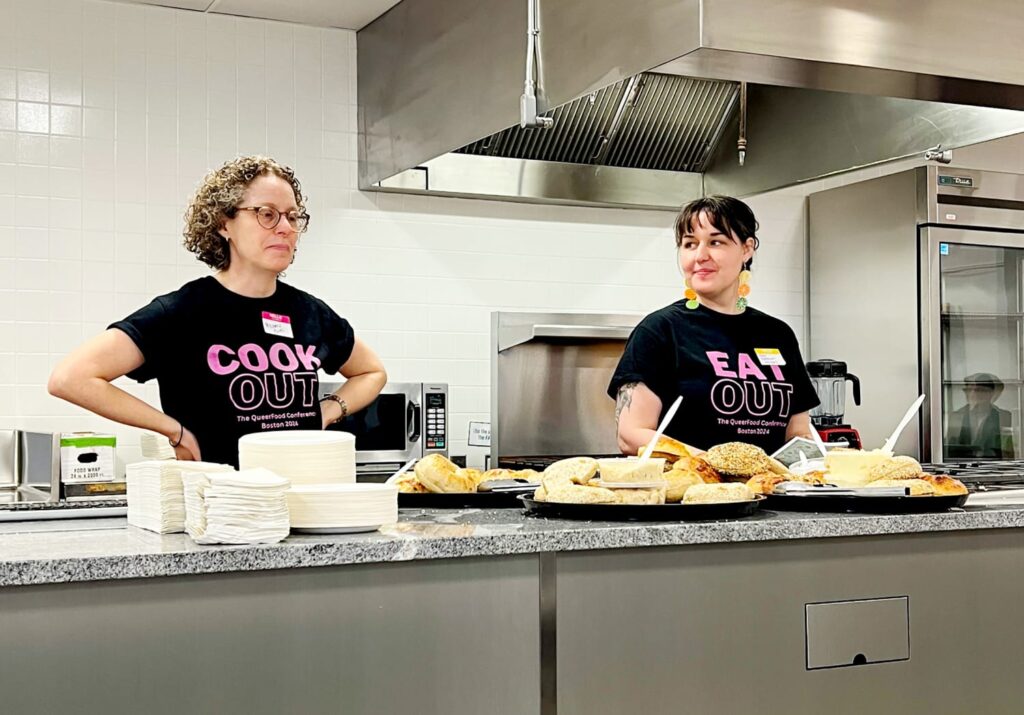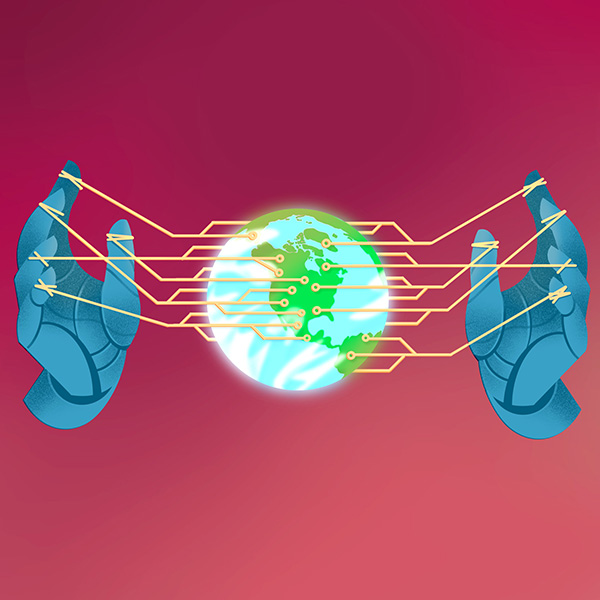Mother Courage opened its doors in New York in 1972, making history as the first feminist restaurant in the U.S., poised at the vanguard of a movement that flourished through the 1970s and 80s. Its regulars included Audre Lorde and other major feminist figures of that era. It enjoyed a relatively short life, though, closing in 1977.
Similarly, the history of women’s restaurants and cafes was also at risk of vanishing – until Alex Ketchum’s historical research documented this vital period of feminist and lesbian activism.
Her 2022 book Ingredients for Revolution: A History of American Feminist Restaurants, Cafes and Coffeehouses takes readers on a lively journey through the feminist restaurant movement, introducing us to the individuals involved, their difficulties and successes.
Ketchum, MA’13, PhD’18, an assistant professor at McGill’s Institute for Gender, Sexuality and Feminist Studies, also explored the issues (often rooted in sexism) the women faced, including financial (Mother Courage’s founders couldn’t secure a bank loan) and political challenges, as well as determining what art to hang on the walls and what music to play – and, of course, what food to serve (often, but not always, vegetarian).
Her work is attracting plenty of attention, and not only in academic circles.

This past April in Boston, she co-organized the first Queer Food Conference with Boston University food and culture historian Megan J. Elias. The event received coverage from a host of media, including The New York Times, The Boston Globe, NBC, and Italy’s la Repubblica. “The conference exceeded my dreams,” Ketchum says. “It was amazing to witness.”
While offering a precise definition of what constitutes feminist or queer cuisine can be tricky – Elias told The New York Times,“Queer food defies categorization, and that’s its beauty” – Ketchum says there are a few key questions to consider.
“Who’s making the food? Is it offering a place to gather?” she asks. “Often these establishments brought money into the community through fundraisers, [through] who was being hired, the kinds of events the venues were hosting, the art on the walls, or the music being played.”
In addition, she notes, some dishes connect to local histories, like the brownie recipes that circulated in San Francisco during the height of the HIV/AIDS epidemic, food that was specifically designed to help people gain weight. “For me, food becomes a vehicle for asking a lot of questions around labour and community,” she explains.
These questions lead across disciplines. “It’s been really great to see how people have taken up the book in different ways,” she says. “For instance, I’ve given talks for music history classes, because there is some music history in the book.”
“I don’t come from a family of academics, and I want my family to be able to read what I am talking about. The impact of research is greater when people from different walks of life can connect with it.”
Alex Ketchum
Ketchum also created Feminist Ingredients for Revolution, a podcast that further examines issues related to feminist and queer food. The episodes, which feature Ketchum speaking with other scholars, artists and activists whose work intersects with her own, are available on her site, The Feminist Restaurant Project.
In conversation Ketchum is lively and approachable, personality traits that also characterize her approach to scholarship. In 2022 she published Engage in Public Scholarship!: A Guidebook on Feminist and Accessible Communication. Both that book and Ingredients for Revolution reach beyond a professional readership.
“I don’t come from a family of academics, and I want my family to be able to read what I am talking about,” she says. “Overall, the impact of research is greater when people from different walks of life can connect with it.”
Consequently, her academic publications are available through open access versions, and she has produced inexpensive zines offering short-and-easy versions of her work.
Her commitment to sharing her work as broadly as possible hasn’t gone unnoticed. Last year, she was one of the recipients of the Principal’s Prize for Public Engagement through Media.
Ketchum’s food research has roots in her undergraduate studies at Wesleyan University in Connecticut. “I was co-running the school’s organic farm, I love cooking and was interested in food politics, and I was taking feminist and history courses,” she says.
Then a friend told her about the nearby Bloodroot Vegetarian Restaurant, founded in 1977 and one of the few remaining feminist restaurants. A visit there piqued her interest in the history of feminist restaurants, and one of her professors suggested it would make an interesting graduate research project.
Her McGill master’s thesis focused on feminist restaurants and cafes in Quebec and Ontario, while her doctorate expanded her scope across Canada and the US.
Today, after a dozen years of exploring feminist restaurant histories (among other things), Ketchum is shifting her focus. In 2019 she launched Disrupting Disruptions: Feminist and Accessible Publishing, Communications and Technologies Speaker and Workshop Series.
The series, in which guest speakers discuss the social, cultural and environmental implications of big data, AI and other technologies, will host its 101st event this fall.
Organizing the series prompted Ketchum to examine the history of IT-related feminist and LGBTQ+ activism, and she is currently completing a history of LGBTQ+ cyber activism from 1980 to 2002. Her activities in her new research field saw her named “one of the 100 brilliant women in AI ethics” in 2021 by the organization Women in AI Ethics.
But even as Ketchum is refocusing her energy, her food and restaurant research continues to assert a pull. She has co-edited Cook Out: The Queer Food Conference Cookbook (recipes were collected from the conference’s participants) and is now co-editing a queer food anthology. And plans are afoot for a second Queer Food Conference to be held in 2026 in Montreal.
“The food research I’ve been working on for so long is just now getting a lot of attention.” she says. “And the LGBTQ+ tech activism research I’ve been building for five years is also starting to take off. They’re happening simultaneously, so it’s a busy, exciting time.”


